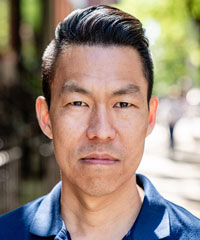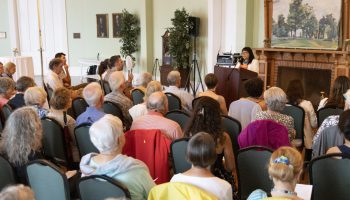
Jack Wang’s debut short story collection, We Two Alone, came at the end of a very long road — he’ll be 48 years old when it’s finally published in September.
“Being a late bloomer is an idiomatic phrase,” said Wang, an author, educator and the Week Nine prose writer-in-residence at the Chautauqua Writers’ Center. “It’s also the title of a Malcolm Gladwell essay titled, ‘Late Bloomers.’ He talks about how we tend to associate genius with precocity, and he says that’s true of some artists — one example he gives is Jonathan Safran Foer, who published Everything Is Illuminated when he was 19.”
But another example Wang said Gladwell gives is that of Ben Fountain, who published his first short story collection, Brief Encounters With Che Guevara, when he was in his late 50s.
“We have this cultural notion of what should be young,” he said. “But as Flaubert says, ‘Talent is long patience.’ So I want to talk about the road to how you can stick with it and persevere, and about this fairly typical path that many authors take. We may often see people publishing in their 20s and 30s, and just assume that if you don’t do it by then it won’t happen, but I’ll talk about how for many people, the bloom comes later in life.”
That bloom will be the centerpiece of Wang’s Brown Bag lecture — the final Brown Bag of the 2020 season — aptly titled, “Late Bloom: Publishing Later in Life,” and which will take place at 12:30 p.m. EDT on Thursday, Aug. 28, on the CHQ Assembly Virtual Porch.
When writing We Two Alone, Wang said he began the project by pursuing individual stories and discrete interests, but eventually grew to see the longer arc and worked more consciously to cover different times and places in history.
“Before I published this collection, I’d written some semi-autobiographical novels, and part of the problem with them was that there wasn’t enough imaginative reach or imaginative scope to these stories,” he said. “For me, historical fiction allows me to refract my own experience through a different time and place and to get at my own experience through that.”
Writing historical fiction requires a tremendous amount of research, Wang said, and if he didn’t feel that he was convinced of the details of a story, then it would be hard for him to believe that anyone else would be.
“You do a lot of research to authenticate time and place in your own mind,” he said. “I love reading obscure memoirs for research. Even the story in the collection set in London in the 1980s, which is fairly contemporary, I had to do a lot of research for it through the British Library, reading obscure theses about Chinese restaurants.”
Part of what Wang said inspires him to write about the Chinese diaspora are phrases that originated from Pulitzer-Prize winning novelist and Chautauqua Literary and Scientific Circle presenter Viet Thanh Nguyen: “narrative scarcity” and “narrative plentitude.”
“When I think about stories about being Chinese, say, I just know that coming up as a young writer, there weren’t a lot of stories that reflected who I was,” he said. “I’m just trying to contribute to that narrative plentitude, to try to tell more stories about what it means to be someone like me.”




